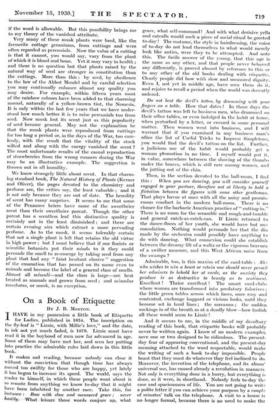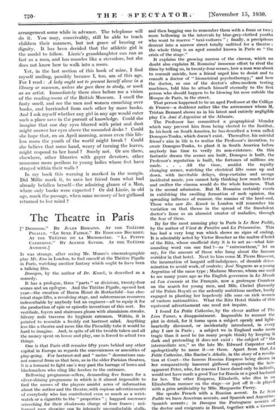On a Book of Etiquette
BY J. B. MORTON.
I HAVE in my possession a little book of Etiquette
for Ladies, published in 1854. The inscription on the fly-leaf is " Lizzie, with Millie's love," and the date, in ink not yet much faded, is 1879. Lizzie must have read it in the boyhood of men now far advanced in age. Some of them may have met her, and seen her putting into practice the admirable rules laid down in this little
book. •
It makes sad reading, because nobody can close it without the conviction that though time has always moved too swiftly for those who are happy, yet lately it has begun to increase its speed. The world, says the reader to himself, in which these people went about is so remote from anything we know to-day that it might have been inhabited, by another race. Take this, for instance Bow with slow and measured, grace ; . never
ay:- 'What --leisure those words conjure up, what grace, what self-command ! And with what derisive yells and catcalls would such a piece of social ritual be greeted fo-day ! The costume, the style in hairdressing, the voice of to-day do not lend themselves to what would merely loOk like antics, were they to be attempted. And note this. The facile answer of the young, that this age is
the same as any -other, and that people never behaved any differently, is proved absurd by reference to this or
to any other of the old books dealing with etiquette. Clearly peOple did bow with slow and measured dignity. Even I, not yet in middle age, have seen them do it, and rejoice to recall a period when the world was decently ordered.
Do not beat the devil's tattoo, by drumming with your fingers on a table. How that dates ! In those days the
devil's tattoo-was left to business men, who drummed on
their office tables, or even indulged in the habit at home, when perturbed by a letter, or crossed in some personal matter. Then women went into business, and I will warrant that if you examined in any business man's office the list of Useful Tricks to Impress Simpletons, you would find the devil's tattoo on the list. Further, a judicious use of the habit would probably get a woman ptomotion in no time. I myself would put it, in value, somewhere between the shoving of the thumbs under the braces, which is still rare among women, and the jutting out of the chin.
Then, in the section devoted to the ball-room, I find this : When you are dancing, you will consider yourself engaged to your partner, therefore not at liberty to hold a flirtation between the figures with some other gentleman. That plays havoc at once with all the noisy and promis- cuous conduct in the modern ball-room. There is no chance for the barbaric American practice of " cutting-in." There is no room for the scramble and rough-and-tumble and general catch-as-catch-can. If Lizzie returned to
the dance-floors of her youth, she would have but one consolation. Nothing would persuade her that the din
made by the orchestra could possibly have anything to do with dancing. What connexion could she establish between the dreamy lilt of a waltz or the vigorous bravura of a swifter measure, and this West African noise from the swamps ?
Admirable, too, is this maxim of the card-table : She who wishes to win a heart or retain one should never permit her admirers to behold her at cards, as the anxiety they produce is as destructive to beauty as to sentiment. Excellent ! Thrice excellent ! The smart card-clubs where women are transformed into predatory fishwives ; the little green tables across which faces, once rosy and contented, exchange haggard or vicious looks, until they become set in hard lines ; the sarcasms ; the sudden suckings in of the breath as at a deadly blow—how foolish all these would seem to Lizzie !
And it occurs to me, in the middle of my desultory reading of this book, that etiquette books will probably never be written again. I know of no modem examples, save one or two designed to be ridiculous. The present- day fear of appearing conventional, and the present-day meaning attached to the word respectable, would make the writing of such a book to-day impossible. People boast that they must do whatever they feel inclined to do.
Moreover,' the invention of the telephone, and its almos'
universal use, has caused already a revolution in manners. Not only is everything done in a hurry, but everything is done, as it were, in shorthand. Nobody feels to-day the ease and spaciousness of life. You are not going to write a polite letter if you can achieve your purpose by a couple of minutes' talk on the telephone. -A visit to a house is no -longer4ormal, because there is no need to make the arrangement some while in advance. The telephone will do it. You may, conceivably, still be able to teach children their manners, but not grace of bearing or dignity. It has been decided that the athletic girl is the model to follow. Lizzie's granddaughter can run as fast as a man, and has muscles like a stevedore, but she does not know how to walk into a room.
Yet, in the last section of this book of mine, I find myself smiling, possibly because I, too, am of this age. For I read : A lady ought not to present herself alone in a library or museum, unless she goes there to study, or work as an artist. Immediately there rises before me a vision of the reading-room of the British Museum. I smell the fusty smell, and see the men and women crouching over books, and barricaded from each other by more books. And I ask myself whether any girl in any age would enter such a place save in the pursuit of knowledge. Could she imagine that one day eyes blurred with print and dust might answer her eyes above the mounded desks ? Could she hope that, on an April morning, across even this life- less room the youth of the world might break ? Could she believe that some hand, weary of turning the leaves, might respond to her hand ? Surely not. Or are there, elsewhere, other libraries with gayer devotees, other museums more perilous to young ladies whose feet have strayed within their walls ?
In my book this warning is marked in the margin. Did Millie mark it, to save her friend from what had already befallen herself—the admiring glance of a Man, where only books were expected ? Or did Lizzie, in old age, mark the passage, when some memory of her girlhood returned to her mind ?









































 Previous page
Previous page